FEATURES
The Restreamer is an entire streaming server solution for self-hosting. Upload your live stream to YouTube, Twitch, Facebook, Vimeo, or other streaming solutions like Wowza. Receive video data from OBS and publish it with the internal RTMP server. The pretty and straightforward user interface is fun to use and easy to understand. Beginners are supported by assistance and test systems and immediately find their way around the complexity of a video server. Professionals appreciate the fast and spontaneous configuration options for complex settings of the applications in everyday work. In addition, the Bandwidth limitation helps calculate the traffic costs to reduce financial and technical risks. It is GDPR compliant without third-party providers and no saving audience data. 100 % control over the video data at any time. And the best thing is that Restreamer is open-source software, has no ongoing license costs, and is free for private and commercial use!
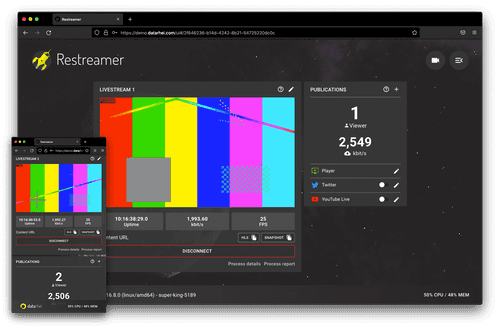
Clean User Interface
The Restreamer offers a simplified admin panel for streaming server newcomers or for users for whom the range of functions of a streaming server is simply too large. The GUI has a clear menu navigation, but also a start screen level with the most important elements. Direct feedback in the user interface with error descriptions speeds up configuration and avoids misconfigurations. In addition, the expert mode extends the range of functions to meet the requirements of professionals.Multiple channels
Build-in video player
Stream statistics
Viewer statistics
Bandwidth information
System monitoring
Publication website
Output control
Expert mode
Multiple Video Sources
The Restreamer can manage various video sources from USB, network, or virtual. In addition, the built-in RTMP server processes video signals from external software such as OBS or hardware video encoders from Blackmagic and Elgato. Finally, as an absolute highlight, Restreamer supports low latency video with an internal SRT server.IP Camera
USB Camera
RaspiCam
OBS
Blackmagic
Video Software
Hardware Encoder
WOWZA
RTMP
RTSP
HLS
DASH
SRT
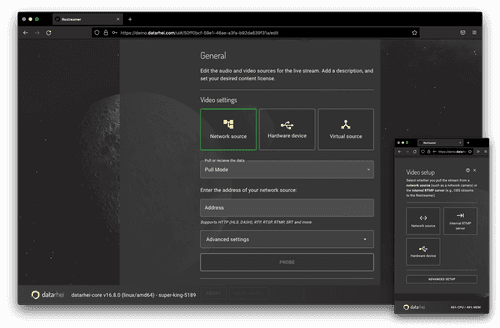
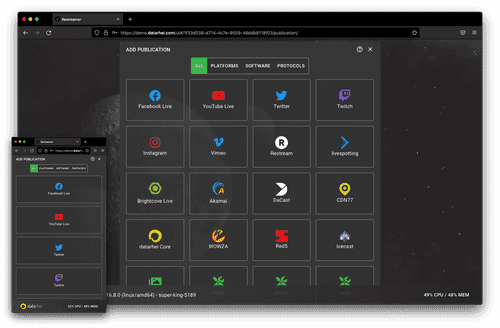
Multi Streaming
With Publication Services, the Restreamer can stream video anywhere. There are many modules available for popular video platforms and social networks. The various video protocols support transmission to broadcast stations, video software, or hardware. In addition, integrating video over a fully documented API allows video streams in your applications with the simplest means without extensive software development.YouTube
Social media
CDN
RTMP
RTSP
HLS
DASH
SRT
API
Red5
WOWZA
Ant Media
Open-Source Video-Player
Video.js is the default player in the Restreamer and a free, open-source web player used by professionals worldwide. It supports HTML5 video and all modern streaming formats. Many HLS players, such as JW Player, Bitmovin, Clappr, or the Theo Player, can be used in the Restreamer. As a unique feature, the datarhei Restreamer exclusive CC plugin is ready to publish a license directly in the video stream, granting the public various usage rights to the work.Creative Commons license
IMA plugin
CSS styling
API
Open-source libary
JW-Player
Bitmovin
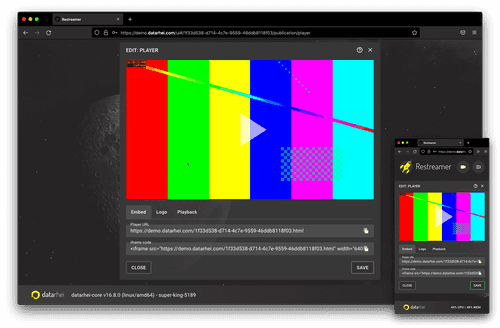
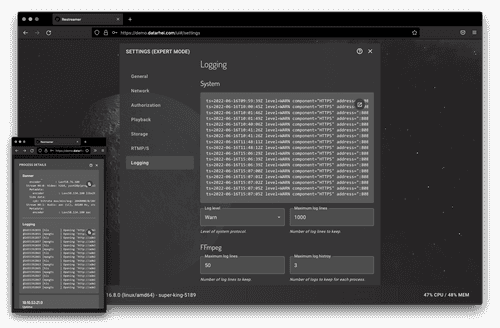
Tons of functions
The Restreamer contains many neat functions that make everyday streaming easier and significantly expand the application possibilities of the program. Log files help analyze errors, monitor proper operation, or improve systems. In addition, log files obtain information about video processing. The data can adapt and optimize the video stream.Multi language
Wizard system
Debug report
System logging
HDMI
DVR
Refferer banlist
Expert mode
Mux audio
Video snapshot
HTTPS Let's Encrypt
User limitation
Bandwith control
RTMP security token
Storrage support
GPU encoding
RTMP server
SRT server
RTSP server
FFmpeg REST API
INSIDE RESTREAMER
datarhei Restreamer is the central interface for mapping AV processes. It is responsible for the design and management and provides all necessary interfaces to access the video content. The control for FFmpeg can keep all used functions reliable and executable without the need for software developers to take care of it. In addition, process and resource limitation for all FFmpeg processes protects the host system from application overload. The overall system gives direct access to current process values (CPU, RAM) and complete control of system resources and system load with statistical access to process data and current and historical logs.